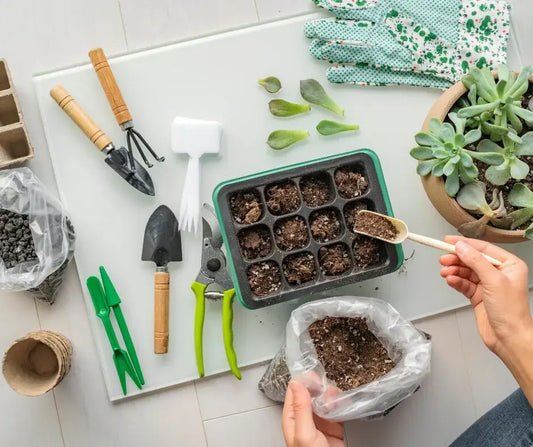
Seeing is believing, it’s true. But you’ve got other senses that need to be fed, even when the garden is slumbering. How about catering to your sense of smell, for example. Think about it. Don’t you miss all those heady scents of the garden? Here’s an idea: Grow herbs in your windows. Herbs are a snap. If you’ve got bright light, this is going to be a cinch. They don’t need high humidity and they don’t demand constant care. People have been growing them indoors and succeeding since the pioneers kept their favorite remedies growing over the winter. You can do this. Why should you try herbs? Because when you tickle the leaves of an herb, wonderful aromas float into the air. Plus, they’re not bad looking either. And then there’s all the cool things herbs do to make your meals more delicious.

What Herbs Crave
Most herbs prefer a bright, south-facing window to really pump out their leaves. They will survive in less light, but a bright window results the healthiest, most aromatic foliage. Water them frequently (but don’t go crazy and drown the poor fellas), they tend to be thirsty plants because they have robust root systems. So let’s talk about putting a smile on the face of those root systems. Herbs prefer generous containers. Although you’ll find itty-bitty herb pots offered, don’t go that route. Instead, keep an eye on the root system and repot regularly when the roots fill the container. The best containers for herbs are long, slender pots—because herb roots tend to shoot straight down. Here’s where an organic potting soil is important because you want to treat your herbs right. A happy herb pours out the essential oils and really tingles your sense of smell. When repotting go for Coast of Maine Bar Harbor Blend Potting Soil and be sure to fill the container fully. Air pockets might cause your herb’s roots to wither when they aren’t in contact with moist soil. Tamp that soil firmly into the container!

Easy Herbs to Host Indoors
Which herbs are the easiest to grow in the average home? You’ve got so many possibilities! For example, thyme, edible sage, marjoram, oregano, winter savory, and black cardamom (grown for the scent of its aromatic leaves) are readily available and apt to fit into your lifestyle. If you lack bright light, try hosting mints—when grown in containers, the roots won’t roam. Scented geraniums send a phenomenal array of scents into the room when you brush against their leaves. Rose scented geranium is the most popular, but feel free to go crazy and collect geraniums (actually pelargoniums) that mimic nutmeg, peppermint, coconut, apple, strawberry, etc.

Super ambitious? Try sweet bay (Laurus nobilis). Sweet bay eventually becomes a small tree and will outgrow the average windowsill, but becoming a jolly green giant happens slowly. You can enjoy its company for a long time before it needs to move into a mansion. If you’re cool with an herb that probably won’t last the whole season, bring a parsley into your life. Sure, they’ll eventually shoot flower stalks up and drop leaves. But you can get a whole lot of enjoyment in beforehand. Sweet basil is everyone’s favorite, but it needs a super bright window. Give basil lots of light, and it will be a happy camper. And be sure to keep planting seeds, because basil is the fastest herb to disappear when dinner is simmering on the stove.
Keeping Insects at Bay
Beyond going organic, another trick to growing herbs at your elbow is to be cool. Literally, most herbs love temperatures that might prompt you to put on a sweater in winter. In fact, keeping temperatures comfortable but not toasty tends to keep pests in check, especially aphids and white flies. In addition, consider quarantining (there’s that word again!) your herbs immediately after adoption to check for pests before giving them a play date with your home team plants. And enjoy! This winter is going to be Nirvana for your Nose!
Written by award winning author, Tovah Martin. Find her books and more information on her website: tovahmartin.com.













